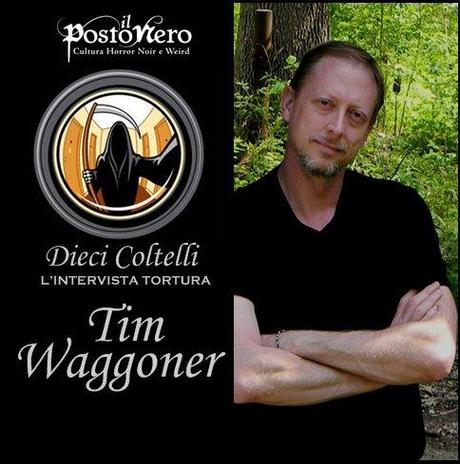
Ten Knives Interview with Tim Waggoner:
Knife 1) Please name at least three contemporary authors who write generally better than you do and why.
[Tim Waggoner] Ramsey Campbell, Laird Barron, Gary Braunbeck. I’m more of a storyteller than a prose stylist, and all three of these writers are wonderful wordsmiths who write in an almost poetic style. They’re masters at creating mood and atmosphere. Ramsey and Laird come up with wonderfully inventive ideas that put their own personal spins on the horror genre. Gary is a master at realistic dialogue, and he digs deep into the heart of his characters, making them live and breathe on the page.
Knife 2) Has ever something happened in your life that made you think give up writing?
[Tim Waggoner] Back when White Wolf Games was publishing original horror novels, they made on offer my novel The Harmony Society. It was the first novel where I’d used the techniques and themes I’d developed in my short horror fiction, and it was something of an artistic risk for me. But White Wolf changed their minds, saying they were no longer “comfortable” with the book and withdrew their offer. I never found out exactly why they’d changed their minds, and it was a hard blow. I don’t know that I considered giving up writing, but I was definitely discouraged and became depressed. Instead of giving up, though, I started writing the first version of my urban fantasy novel Nekropolis, which has since spawned a three-book series.
Knife 3) Which compromises did you have to accept for commercial reasons?
[Tim Waggoner] I had the opportunity to write an original A Nightmare on Elm Street novel for Black Flame some years ago. The original proposal dealt with Freddie Krueger becoming human again, and while he initially enjoys his return to mortality, he eventually seeks a way back to the dream realm. The editors loved the proposal and sent it off to Newline Cinema for approval. Meanwhile, I started writing the book. I was sixty pages into the manuscript when I got word that Newline refused to approve my idea because they feared having Freddie as a human would remind readers that he was originally a child molester and murderer. Since Newline owned the rights to the franchise, I had no choice but to accept their judgment. So I was forced to throw out the sixty pages I’d already written and begin an entirely new story which became my novel A Nightmare on Elm Street: Protégé.I had the opportunity to write an original A Nightmare on Elm Street novel for Black Flame some years ago. The original proposal dealt with Freddie Krueger becoming human again, and while he initially enjoys his return to mortality, he eventually seeks a way back to the dream realm. The editors loved the proposal and sent it off to Newline Cinema for approval. Meanwhile, I started writing the book. I was sixty pages into the manuscript when I got word that Newline refused to approve my idea because they feared having Freddie as a human would remind readers that he was originally a child molester and murderer. Since Newline owned the rights to the franchise, I had no choice but to accept their judgment. So I was forced to throw out the sixty pages I’d already written and begin an entirely new story which became my novel A Nightmare on Elm Street: Protégé.
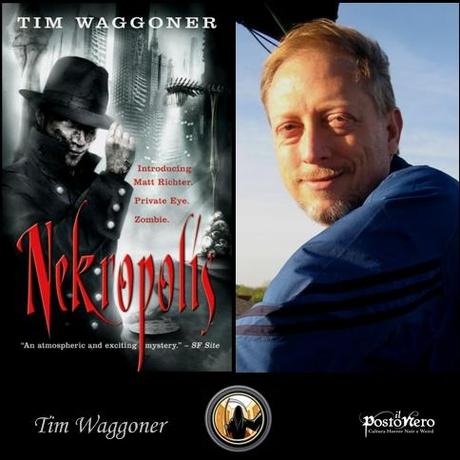 Knife 4) Is it very important to win literary prizes? Does it help to sell?
Knife 4) Is it very important to win literary prizes? Does it help to sell?[Tim Waggoner] Winning a prize can certainly help boost an author’s confidence and make him or her feel as if their work is recognized by peers and readers. In terms of a writing career, winning a major literary prize can be a useful marketing tool and draw more attention to a writer and his or her work, but ultimately, I think readers respond more to the story itself than they do to whether or not it’s won a prize. But don’t get me wrong – I’d be happy to take as many literary prizes as people want to bestow upon me!
Knife 5) When you have no ideas for writing, how do you bring down yourself and whom do you phone to
[Tim Waggoner] When I’m having trouble coming up with ideas for a story or a scene, I often will talk to my girlfriend. While she provides useful feedback, what I need most is for someone to just listen while I babble on about the project I’m working on. Usually, just the process of talking out story problems spurs my mind to produce ideas, and I’m off and running again. When I can’t find someone to talk to, I just keep plugging away at the story, maybe taking breaks to walk around a bit or surf the Net, check e-mail, etc. I often write in a bookstore café, so I’ll wander around the store and look at different books, maybe pick up one or two and read a few lines in the hope that it’ll jump start my brain. Sometimes I’ll switch from working on one project to working on a different one to see if that’ll get my creative juices flowing again. And if all else fails, I shut off the computer and go do something – anything – that’s not writing-related, and I’ll try again the next day.
Knife 6) What do you think when you read your country's best seller rankings?
[Tim Waggoner] While in one sense, the bestseller list reflects what a mass readership is buying – usually a mix of thrillers, high-end romance, and mainstream novels – in another sense it reflects which books publishers are willing to market heavily. I’ve heard a story (which may well be apocryphal) that the publisher of The DaVinci Code decided to test the theory that they could make a bestseller by promoting the hell out of a book. They chose Dan Brown’s novel, did indeed promote it like crazy, and it debuted on The New York Times bestseller list. I have no idea if the story is true, but it certainly suggests that a “bestseller” isn’t always what it seems.
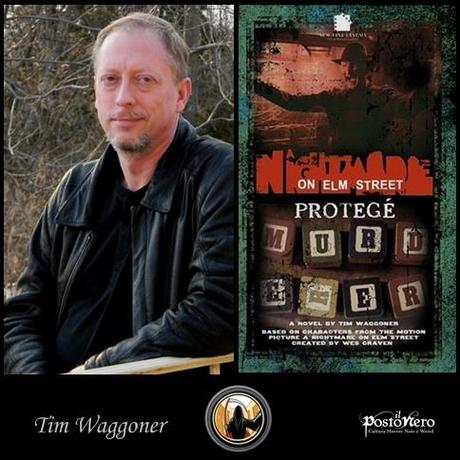
Knife 7) What do you reproach to American publishing? What are its limits?
[Tim Waggoner] The market-driven nature of American publishing is its greatest limitation, at least in an artistic sense. Genre fiction sells better than literary fiction in America, and within genre fiction there is a set of expectations – if not exactly restrictions – in terms of what publishers think readers will accept. A lot of science fiction, fantasy, mystery, horror, and romance novels fall within certain boundaries, sometimes to the point where they read like clones of one another. Small press publishing, especially in the horror field, has a much broader range of content, style, and approach.
Knife 8) How many times have you refused to participate to a no-profit project?
[Tim Waggoner] I’ve never refused, but then, I haven’t been asked to participate in no-profit projects very often. I’m happy to participate when the project is for charity, and I’ll also participate if the project is attractive to me as an artist. Otherwise, I’d prefer to avoid such projects. Often, the reason they are no-profit is because the project is headed by a hobbyist instead of a professional editor.
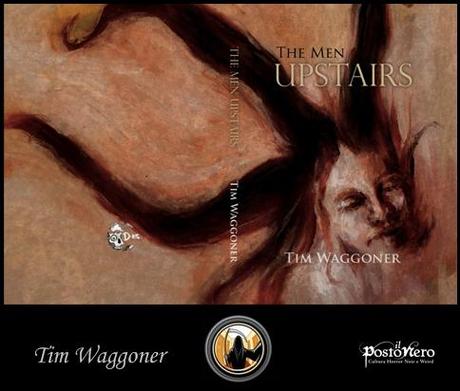
in uscita a Febbraio 2012 per Delirium Book - Cover di Daniele Serra
Knife 9) What did you do right after signing major book deal?
[Tim Waggoner] I try to do something fun to celebrate, perhaps go out to eat at a nice restaurant or go see a movie. But at this point, I’ve had so many novels published that, while I’m still happy every time I sign a new contract, it’s no longer a new experience for me. So I don’t feel the need to indulge in a huge celebration. It’s just business as usual.
Knife 10) Final question: Whom to (or to what) would you throw a knife?
[Tim Waggoner] I am a calm, rational, non-violent man who would never throw a knife at anyone. At least, that’s the story I plan to tell the police when they come knocking at my door.
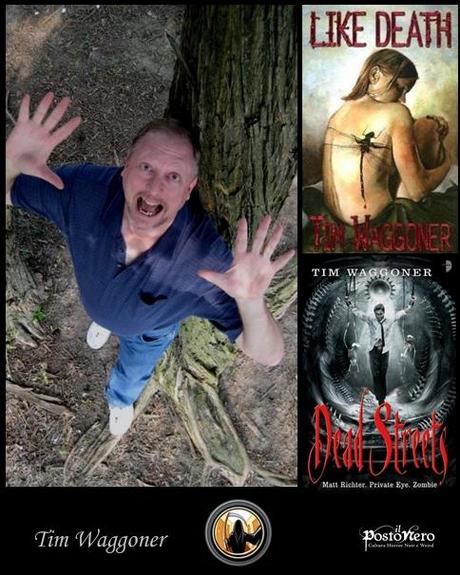
Guest Profile
Tim Waggoner wrote numerous novels, two short story collections, and over one hundred published stories, novellas and nonfiction in the Horror, Fantasy and Thriller genres. He graduated from Wright State University in 1989 with a Master of Arts in English with a Creative Writing Concentration. He has worked as an editor and a newspaper reporter. He currently teaches creative writing at Sinclair Community College in Dayton, Ohio, and in the MA in Writing Popular Fiction program at Seton Hill University. Some of his Novels: Dying for It (2001) The Harmony Society (2003) Dark Ages: Gangrel. (2004) Nekropolis (2004) Defender: Hyperswarm (2004) Like Death (2005) Exalted: A Shadow Over Heaven's Eye (2005) A Nightmare on Elm Street: Protege (2005) Pandora Drive (2006) Darkness Wakes (2006) Cross County (2008) Last of the Lycans (2010) Web Site
Interview by Alessandro ManzettiHWA Co-ordinator Italy
Read the Interview in Italian
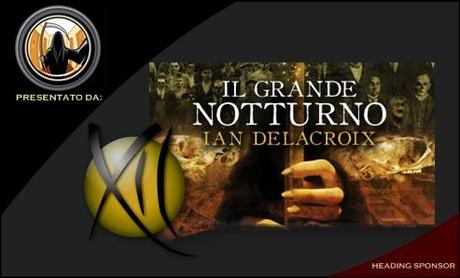
Scopri come sponsorizzare le rubriche e i contenuti del Posto Nero

![[Anteprima] oltre stelle Brilleremo milioni soli Beth Revis](https://m2.paperblog.com/i/289/2897899/anteprima-io-e-te-oltre-le-stelle-brilleremo--L-j_QXCY-175x130.jpeg)

![[Anteprime Piemme] Younger ragazza Orchard street](https://m22.paperblog.com/i/289/2895893/anteprime-piemme-younger-la-ragazza-di-orchar-L-6ND8P5-175x130.jpeg)



